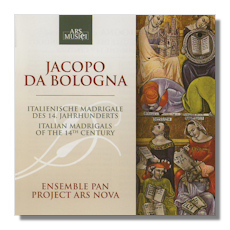
The Internet's Premier Classical Music Source
Related Links
- Jacopo da Bologna Reviews
- Latest Reviews
- More Reviews
-
By Composer
-
Collections
DVD & Blu-ray
Books
Concert Reviews
Articles/Interviews
Software
Audio
Search Amazon
Recommended Links
Site News
 CD Review
CD Review
Jacopo da Bologna

Italian Madrigals of the 14th Century
- Oselletto salvazo
- Io me sun un che
- Oselletto salvazo
- Prima virtute
- O in Italia felice Liguria
- Nel mio parlar
- Aquila altera (Codex Faenza)
- Aquila altera - Creatura gentile - Uccel di Dio
- Sotto l'imperio
- Avendo me' falcon
- Lo lume vostro
- Lux purpurata radiis - Diligite iusticiam
- Non al suo amante (Codex Faenza)
- Non al suo amante
- Posando sopra un'acqua
- I' senti' za' l'arco
Ensemble Pan
Project Ars Nova
Ars Musici 232306
This is a CD containing performances of great musicality. Ensemble Pan (or perhaps P.A.N. for Project Ars Nova referring to the fourteenth century polyphonic style, Ars Nova, as well as the mercurial mythological musical figure, Pan) has only half a dozen or so CDs to its credit. This one offers 16 short madrigals from fourteenth century Italy. It should add considerably to the group's standing and ought to be snapped up by all lovers of early vocal music and poetry. The performances are focused, full of humanity, expression and a blend of technical excellence and exuberant articulation.
Founded in the early 1980s at the Schola Cantorum in Basel (Switzerland) by Americans Laurie Monahan (mezzo soprano), Michael Collver (countertenor, corno muto), and Crawford Young (lute), it was joined in 1984 by Shira Kammen (bowed strings) and John Fleagle (tenor, medieval harp). Widespread recognition for the Ensemble first came at the Boston Early Music Festival three years later. These performances (which last barely three quarters of an hour) were actually recorded (by Deutsche Harmonia Mundi) in 1985; this CD is from 2010, though, and features Sterling Jones ("fidel", or vielle and rebec, organetto, lute) as well as Monahan, Collver and Young.
Madrigals from this period are highly distilled and intense works of art. Melody, tonality and phrasing are intricately conceived and meticulously crafted to communicate the passions of the texts. Ensemble PAN brings out every such nuance and stroke as faithfully as the current state of musicology knows how and as living performers should. They respect the music as it is, despite the fact that we know so little of Jacopo da Bologna (c.1340 - c.1386).
He came from Padua in northern Italy, a university town and center of artistic innovation, da Bologna flourished in the decades either side of 1350. Several of the madrigals here either refer to or allude more obliquely to Jacopo's life, events in his world and people active – in court circles, for example – during the long (and calamitous) fourteenth century in northern Italy. Actual connections (of conspirators and unfaithful seductresses to the texts in Lo lume vostro [tr.11] and Posando sopra un'acqua [tr.15]) remain conjecture, however plausible.
The approach which Ensemble PAN takes is one of treating the music, for all the clarity and directness of most of the equally mellifluous Italian poetry, as self-standing. Emotions are emotions, regardless of their origins. At the same time, there's a consistency, an informed steadiness to the singing and playing (the sequencing is well worked out and adds to our sense of the music's freshness), which serves to convey the passion of poet and composer.
Jacopo has a broader palette of emotive techniques, though: some of his refrains are downright sarcastic. "Plainer" humor is clearly important too. Ultimately, though, it's the singular thrust of texts celebrating the necessarily very human responses to events, trends, religious imperatives and equally human amorous stimuli which inspire Jacopo the most. The members of Ensemble PAN both have those responses to him; and at the same time perform in such a way that they're standing back from such reactions and are observing them emphatically and deliberately for and with us, listeners almost 650 years later.
This recording was made in the Musikakademie in Basel, which has an intimate acoustic well suited to the close, which is not to say closed, hue of these madrigals. It also aids the sense of transparency which Ensemble PAN obviously prizes. The booklet contains brief notes and the texts in Italian and Latin with German only translations. If this repertoire is even of passing interest to you, this is a CD to treasure. If you actively seek out madrigals and texts set in the Ars Nova style and/or the compositions of Jacopo da Bologna, it's a must.
Copyright © 2010 by Mark Sealey.





















